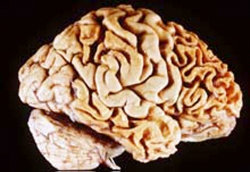Vascular Dementia. Cerebrovascular Mechanisms and Clinical Management. Edited by Robert H. Paul, PhD, Ronald Cohen, PhD, Brian R. Ott, MD and Stephen Salloway, MD (Human Press as part of the "Current Clinical Neurology Series")- The authors are faculty members in the Department of Psychiatry and Human Behavior and the Department of Clinical Neurosciences, Brown Medical School.
Alzheimer's disease dominates the field of dementia both epidemiologically and in the medical and popular press. At the same time recent attention has also been provided to 'newer' causes of dementia - eg. diffuse Lewy body disease and frontotemporal dementia. The result is that vascular dementia is relatively neglected in the consideration of physicians. The publication of this text serves to remind us of this important clinical entity and bring its readers up-to-date on the extensive clinical and basic science work that has been done in this area over the past several years.
The book provides a multidisciplinary review of the current understanding of vascular dementia. sections are devoted to basic mechanisms, clinical and social sequelae, neuroimaging and clinical management. Particular emphasis is placed on the interaction between vascular and Alzheimer's dementias in a dedicated section with five chapters.
Learning about vascular dementia is challenging; there is considerable controversy over its definition, diagnosis and treatment even its existence. Terminology is also in a state of flux. The book does an excellent job at presenting and clarifying many of these issues. In areas that are either somewhat controversial or in which clear answers are still wanted, the editors and authors are to be commended for presenting careful, thoughtful, evidence-based reviews with open acknowledgement of knowledge gaps. The text is current and extensively referenced. The tables and figures are well presented. There is an appropriate balance between basic science and practical clinical information. While any clinician taking care of patients with dementia will find much of value in this book, I suspect that its main appeal will be for clinical researchers in this area.
REVIEWED BY JANET WILTERDINK, MD
Janet Wilterdink, MD, is Associate Professor, Department of Clinical Neurosicences, Brown Medical School.
Copyright Rhode Island Medical Society Sep 2005
Provided by ProQuest Information and Learning Company. All rights Reserved



